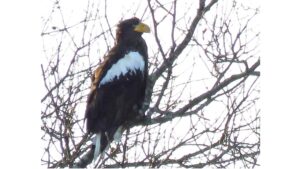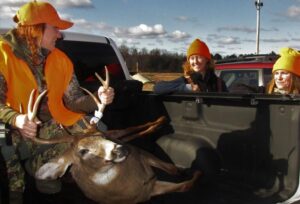BOW 2021 deer hunt results
Seventeen women deer hunters participated in MassWildlife’s 2021 Becoming-an-Outdoors-Woman (BOW) Deer Hunt Program. On opening day of the shotgun deer hunting season on November 29, they experienced a guided deer hunt with the assistance of volunteer mentors at Fort Devens.
According to Marion Larson, MassWildlife Chief of Information & Education, nearly all the women saw deer and all participants enjoyed their hunt. Two women harvested their first deer ever. “Sharing that experience was both exciting and overwhelming. This course was amazing. Thanks to everyone who makes it what it is!” said one of the seventeen novice women deer hunters.
MassWildlife expressed its sincere appreciation to their enthusiastic and dedicated volunteer mentors who shared their knowledge and support with these new hunters.
To prepare for the mentored hunt, the women attended a virtual seminar in October where they learned about deer biology and management, hunting regulations, where to find places to hunt deer, and deer hunting tips. Later in the month, they took part in an in-person field seminar at the Shirley Rod and Gun Club where they learned about proper clothing and other useful hunting gear, spent time on a shooting range, discovered how to look for deer sign, estimated distances and when to shoot or not shoot at a deer, and then followed a blood trail.
In addition to offering shooting skills workshops and hunting seminars designed for adult women, the BOW Program has other workshop offerings such as: basic fishing, beginning shotgun, kayaking, map & compass, reading the woods, archery, pond and stream adventures, nature photography, martial arts, outdoor and game cooking, edible plants and more.
To learn more about MassWildlife’s BOW Program click onto the Becoming an Outdoors-Woman page of the MassWildlife web site.
The Massachusetts Junior Conservation Camp
I’ve written about this camp in the past, but it is such a wonderful program it bears repeating. The MJCC provides a unique experience of conservation, shooting sports, and outdoor recreation education to young people. The camp’s program introduces them to the ethical responsibilities of hunting and fishing and encourages careful stewardship of our natural resources. It also aims to educate campers about conservation of natural resources and responsible use of the environment. Natural resource professionals from state agencies provide hands-on experiences and demonstrations and lead discussions of wildlife, fisheries, and forest management.
The MJCC program is open to boys and girls aged 13 to 17. The dates for this year’s camp are August 7–19, 2022. This year, they will host the camp at the Moses Scout Reservation located at 310 Birch Hill Road in Russell, MA. Applications are accepted on a first-come, first-served basis. (Reservations opened on January 1, 2022).
Although campers may apply on their own, over 85% of them are sponsored. Each year, the Berkshire County League of Sportsmen (BCLS), sponsors two kids (a boy and a girl) and the Lenox Sportsmen’s Club sponsors four. (The Cheshire Rod & Gun Club and the Adams Outdoor for Youth kick in funds to both to help defray the costs.) The cost of the scholarship is $1,100 per youth for the full two weeks which covers lodging expenses, food, and activities. (Now you know why these clubs hold so many raffles and events – to raise monies to send youths to the MJCC for free. No better places to spend our funds than on our youth).
The camp reserves the right to limit the number of campers of a particular sex in order to create balanced separate sleeping accommodations.
Campers need to be prepared to function in an environment which requires good behavior, teamwork and attentiveness. Much of the Camp is spent in an educational environment and students are expected to be attentive, courteous and non-disruptive.
A large portion of the instruction is “hands-on,” and all students participate in instruction that includes firearms of several types, bows, arrows, fishing and camping equipment and wildlife interaction. Students are expected to understand the seriousness of handling such equipment and interacting with wildlife.
The happiest campers are those who are interested in the outdoors and in wildlife management programs before attending the MJCC. Teenagers who are sent because a relative is an avid outdoorsman may dislike the camp curriculum, unless they personally have an interest in the outdoors, and will often end up being sent home. For this reason, the BCLS (and probably other clubs) require the youths to write a letter explaining why they want to go to the camp.
If you are unsure of your child’s interest in the camp, it is suggested that you let him or her browse the pictures of the camp program. Or, just ask 15-year old Jerry Conlin. Last year, the BCLS sponsored him.
Jerry said that what he liked best about the camp was “Probably, the shooting, all types of shooting like the trap, targets for rifles, and archery. They had some 3-D targets there, too. It was just really fun.” They also had some swimming, boating and fishing classes there.
Asked if he learned anything new, he said, “They had one class about plants. “We were taught about specific plants, those you can and those you should not eat and what they would do to you if you did eat the wrong ones.”
Jerry won some awards. At the very end of the 2 weeks, there was a camp-wide competition and he won 1st place in the shotgun sporting clays and he took 3rd place in archery. “The day before the actual competition, shooters had to qualify. Only 3 people in the entire camp qualified for archery, rifle and shotgun, and he was one.
Jerry had a good time. “Being around a group of kids with the same interests is cool”, he said. He became close friends with basically all of the people in his campsite, and he keeps in touch with them.![]()
If parents would like their child to attend the camp, but need financial assistance, click onto the MassWildlife web site, complete the Camper Request for Scholarship and send it in as soon as possible. They will do their best to match your child up with groups that have reserved a spot, but do not have a camper.
Is that a vagrant eagle?
Did you hear about that strange lost eagle? Well, according to a MassWildlife it’s a Steller’s Sea Eagle (Haliaeetus pelagicus, which is native to Asia, specifically Japan, Korea, China and Russia. It was first seen in August 2020 in Alaska on the Denali Highway about 4,700 miles away from its native range. It has since been sighted in New Brunswick and Quebec, Canada in July of 2021, in Nova Scotia in November, 2021 and, guess what, a couple of weeks ago it was spotted on the Taunton River in Massachusetts.
It has a distinctive yellow beak with unique white marking on its wings with large white tail feathers. A Steller’s Sea Eagle weighs up to 20 pounds and has a wingspan of up to 6 1/2 feet, making it one of the largest raptors in the world.
Birders are confident the same eagle in Nova Scotia was also seen in various parts of North America because of the unique white markings on its wings. The New York Times thinks that it may have been spotted in Texas this year, but they are not positively sure because it was only photographed perched, not with outstretched wings where distinguishing markings would be visible.
Experts say that it is possible for birds to lose a sense of direction when they stray out of range of their normal habitat, potentially due to climate change effects or a navigational error. Or was it a vagrant, which is not uncommon. According to Alexander Lees, an avian vagrancy expert at the Manchester Metropolitan University (United Kingdom), vagrancy occurs when a bird veers off course, possibly due to a navigation error, or it may have been blown off course by extreme weather patterns. Vagrancy may also help migratory birds expand ranges, an advantage to their survival as global warming changes suitable habitats for many species.
Experts suspect it may migrate with native bald eagles along the coastline, make its way back to its normal ranges in northeastern Asia or stick around the east coast.
Time will tell.
Stay safe!

